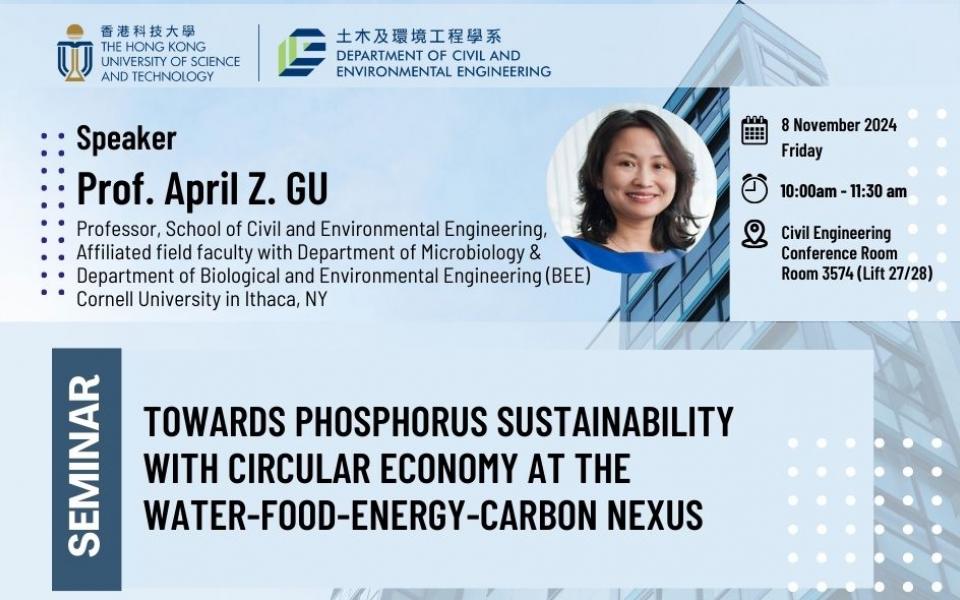Civil Engineering Departmental Seminar - Towards Phosphorus Sustainability with Circular Economy at the Water-Food-Energy-Carbon Nexus
Supporting the below United Nations Sustainable Development Goals:支持以下聯合國可持續發展目標:支持以下联合国可持续发展目标:
Towards Phosphorus Sustainability with Circular Economy at the Water-Food-Energy-Carbon Nexus
Within the framework of the renowned phosphorus (P) paradox, P is an irreplaceable, scarce element for food security and renewable energy (biofuel) production and, at the same time, its inefficient use and loss to the environment is also the leading cause for widespread eutrophication that threatens global water security. To offer long-term off-site life cycle environmental and health benefits, there is an imperative need of paradigm shift towards a more sustainable regional-scale nutrient management system that incorporates P recycle from wastewater sources, water quality protection and, energy and carbon demand abatement. Our team has been working on addressing the recognized three challenges that limit the implementation of sustainable P recycling and management system: 1) the need of an integrated bioprocess for simultaneous energy capture, and nitrogen (N) and P remediation and recovery; 2) a lack of cost-effective and environmentally-sound biotechnology for P recovery from high-strength agricultural wastes to enable P recycle; 3) unpredictable and largely unknown impact of recycled biofertilizer application on crop production and long-term soil health. Conventional biological nutrient removal (BNR) processes are usually energy intensive and require sufficient carbon, often additional external carbon, to reliably meet stringent regulatory requirements. Our research group are working towards breakthroughs in theoretical understanding and successful implementation of external carbon-independent, energy-efficient and reliable integrated A-stage carbon capture, side-stream enhanced biological phosphorus removal (S2EBPR) and short-cut N removal for simultaneous P, N and energy recovery from various municipal and agricultural wastewater. The S2EBPR technology creates a better controlled ecological selection condition that involves more favorable and different underlying mechanisms from those in convectional EBPR, thus overcome the challenges and limitations that prevent its coupling with carbon-capture and short-cut N removal processes. We integrated advanced genomics, phenotyping, data analytics and modeling to discover function-targeted and high-resolution ecological-system dynamics and rules. We pioneered the operational phenotypic units (OPUs) concept based on single cell Raman Micro-spectroscopy (SCRS), and developed phenotype-targeted genomics via coupled FACS-phenotyping-genotyping, which enabled a novel, non-invasive phenotyping method for revealing the microbial physiological diversities within ecosystems in response to stressors such as climate change. To close the circular economy for P sustainability, we aim to optimize the value-added product-biofertilizer from the above treatment process, which will alleviate the reliance on inorganic P fertilizers that has negative implications on soil health. In collaboration with the NSF CROPPs center team, we demonstrated the superiority of recycled biosolids on plant growth enhancement, and we are investigating the roles of key bioagents within the plant-rhizomicrobiome interactions in enhancing the plant health and resilience. These efforts contribute to the realization of the paradigm shift towards P sustainability with circular economy at the water-food-energy nexus.
Dr. Gu is a full professor in School of Civil and Environmental Engineering, affiliated field faculty with Department of Microbiology and Department of Biological and Environmental Engineering (BEE) at Cornell University in Ithaca, NY. Dr. Gu received her B.S. in Environmental Engineering and Science from Tsinghua University and a Ph.D. in Civil and Environmental Engineering, jointly in Microbiology, from the University of Washington. She was a visiting professor at University Vienna in 2014 and at University of Oxford in 2018. Her expertise and areas of research interest include: 1) biotechnology for water and wastewater treatment and biological nutrient removal; 2) risk-based water quality monitoring and toxicity assessment; 3) microbial roles in phosphorus cycling and bioavailability in natural ecological systems, 4) biosensors and nano-sensors. She has led and participated over 30 research projects funded by various agencies including NSF, DOE, EPA, WERF, WRF, USDA/NIFA, EDF and NIEHS. She has been a coauthor for over 190 journal, conference and other technical publications and given 280 presentations at conference and workshops, including more than 80 invited talks. She and her team have received a number of national awards including NSF CAREER award, WEF Ralph Fuhrman Medal, CAPEES/Nanova Frontier Research Award, AEESP outstanding service awards, AEESP/Mary Ann Liebert Award for Publication Excellence in Environmental Engineering Science, HDR National Pathfinder Award for Creativity, SETAC Global Best Student Paper Award and, IEEE Yong researchers Forum Award and ACS Outstanding Presentation Merit Award etc. She received the Søren Buus Outstanding Research Award and Excellence in Mentor Award from Northeastern University and elected to be an inaugural COE faculty Fellow in 2014. She was invited speaker for Gordon Conference-Drinking Water Disinfection Byproducts 2017, Gordon Conference -Environmental Nanotechnology 2013, and Gordon Conference – Water Science in 2012. She has been elected to serve on the Board of Directors for AEESP from 2017 to 2020. Dr. Gu is an elected Fellow of Water Environment Federation.
